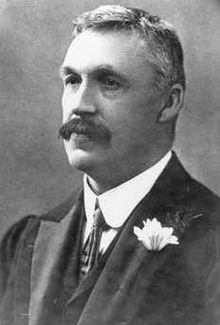Archibald Henry Peake
| Archibald Peake | |
|---|---|
 |
|
| 25th Premier of South Australia Elections: 1910, 1912, 1915, 1918 |
|
|
In office 5 June 1909 – 3 June 1910 |
|
| Monarch |
Edward VII George V |
| Governor | Sir Day Bosanquet |
| Preceded by | Thomas Price |
| Succeeded by | John Verran |
|
In office 17 February 1912 – 3 April 1915 |
|
| Monarch | George V |
| Governor |
Sir Day Bosanquet Sir Henry Galway |
| Preceded by | John Verran |
| Succeeded by | Crawford Vaughan |
|
In office 14 July 1917 – 8 April 1920 |
|
| Monarch | George V |
| Governor | Sir Henry Galway |
| Preceded by | Crawford Vaughan |
| Succeeded by | Henry Barwell |
| 15th Leader of the Opposition (SA) | |
|
In office 1915–1917 |
|
| Preceded by | Crawford Vaughan |
| Succeeded by | Crawford Vaughan |
|
In office 1910–1912 |
|
| Preceded by | John Verran |
| Succeeded by | John Verran |
| Personal details | |
| Political party |
Liberal and Democratic Union, Liberal Union |
Archibald Henry Peake (15 January 1859 – 6 April 1920) was an Australian politician. He was Premier of South Australia on three occasions: from 1909 to 1910 for the Liberal and Democratic Union, and from 1912 to 1915 and 1917 to 1920 for its successor, the Liberal Union. He had also been Treasurer and Attorney-General in the Price-Peake coalition government from 1905 to 1909.
Peake's family migrated from Chelsea, London in 1862, initially settled in Victoria, before moving to South Australia two years later. Peake was educated at state schools under his father, but in later life widened his education by studying in English history and literature. He entered the service of the district council of Narracoorte, became district clerk in 1878. In 1893 he contested Albert in an election for the House of Assembly and was beaten by 50 votes, but four years later won the seat by two votes. He resigned his position as district clerk when he entered politics, and afterward was in business at Mount Barker as a member of the firm of auctioneers, Monks and Peake.
Peake was elected to the South Australian House of Assembly as the Member for Albert representing Narracorte. After his election, Peake was at first an independent supporting the Liberal Governments of Charles Kingston and Frederick Holder. He became disillusioned with the Government of John Jenkins leading him to become leader of a group of 15 members under the Liberal banner.
...
Wikipedia
